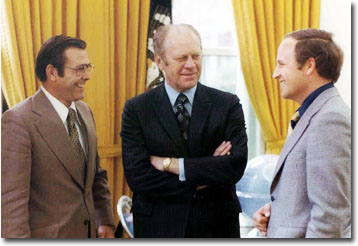
By Bob Schildgen
Sure, I'll go along with those historians who have declared George W. Bush to be the worst president in our history. They've laid out some pretty persuasive evidence to rank him even lower than that remarkable Trinity of Failures, James Buchanan, Andrew Johnson, and Warren G. Harding.
(For more on this dismal topic, see
www.rollingstone.com/news/profile/story/9961300/the_worst_president_in_history )
But I'm sick and tired of watching Democrats who voted to unleash Bush in Iraq turn around and complain about how badly Bush has "handled" this disastrous war. Before making Bush into a scapegoat they ought to face up to their own responsibility and their own complicity in this war, and acknowledge their own bad judgment.
Instead, they conveniently ignore their role in this violence, or blame faulty intelligence reports, or claim it was an agonizing decision somehow forced on them by circumstances. My own senator Diane Feinstein, for example, sent me a letter in which she offloads her responsibility by saying that "The Senate vote on the resolution to authorize the use of force in Iraq was . . . difficult and consequential." Well, yes, but just because a decision is "difficult and consequential" doesn't justify making the wrong decision.
Feinstein also says that the vote was "based on trust" in the intelligence that was received.
But what was the CONTENT of this intelligence? Certainly the intelligence that was publicly presented was so transparently phony that any halfway informed person would question it. At times it was downright laughable, as with Colin Powell’s talk about aluminum tubes and mysterious trucks in the desert. His statement to the UN that "these are not toothpicks" was so feeble it actually telegraphed that he was not convinced any threat existed. (If not toothpicks, then what? Popsicle sticks? Railroad spikes?) If we always moved on such flimsy excuses, we’d be bombing deserts everywhere from the Mohave to the Kalahari
And if the evidence these war-supporting senators saw was different than the unconvincing nonsense that was publicly presented, we ought to be told exactly what it was that convinced them.
Hillary Clinton's justifications are even shabbier. In an interview with CNN in April 2004 she said: "No, I don't regret giving the president authority because at the time it was in the context of weapons of mass destruction, grave threats to the United States, and clearly, Saddam Hussein had been a real problem for the international community for more than a decade." So she voted to go to war because of a "context"? I'll spare you the invocation of George Orwell and his masterful "Politics and the English Language." Read it if you haven't. Reread it if you have.
But what about that grave overpowering "context." Well, according to Hillary Clinton, it was the very same "context" Bill Clinton had, the difference being that Bill Clinton never demanded an all-out war over a "context."
"The consensus was the same from the Clinton administration to the Bush administration," she said. "It was the same intelligence belief that our allies and friends around the world shared."
So what was the difference? Well, only that Bush "believed" in the "belief" and the "context" more strongly than Bill Clinton. Yes, we went to war because of a belief in a belief. After this revelation, which makes the most loopy fundamentalist a cold rationalist by comparison, Hillary Clinton doesn't just twist the language, she throttles it to death: "But I think that in the case of the [Bush] administration, they really believed it. They really thought they were right, but they didn't let enough sunlight into their thinking process to really have the kind of debate that needs to take place when a serious decision occurs like that."
Oh, so it was Bush who pulled down the shades? Only that Prince of Darkness Bush? But of course, because those bright beams of inquiring thought! Wondrous how they streamed down on Congress, shining in the minds of John Kerry and may other Democrats who vote for war.
Hillary Clinton continued: "You have to have a decision-making process that pushes a lot of information up and asks a lot of hard questions. You don't get that sense from this White House." Yeah right.
This focus on Bush's bad strategies and the tortured explanations of their vote only makes people wonder about the real motives Democrats who voted for war, and raises the question whether they were being opportunistic, trying to convince voters that they were not soft on terrorism or anti-military or weak on national security issues. It makes me want to say, "Come on, cut the crap about intelligence. What were your other motives? Were you listening to your conscience or you focus group? Give us a straight answer, and we might forgive you."
But even if there HAD been incontrovertible evidence that Iraq possessed WMDs, there was still no compelling reason to start a war, not with the following strong arguments against it
1) THE INSPECTION TEAM: the international inspection team was doing its work, finding nothing, and there was no reason not to allow it to continue until it completed its assessment. Hillary Clinton herself had the gall to criticize the Bush administration for not allowing the weapons inspectors "to finish whatever task they could have accomplished to demonstrate one way or the other what was there." She must have profound faith in the America's collective amnesia to call attention to this Bush failure, because the need to let the inspection team finish its job was a major argument against the invasion she voted for.
2) INSTABILITY AND OUTRAGE IN THE MIDDLE EAST AND THE MUSLIM WORLD: Various commentators and observers, especially on the left, warned that attacking Iraq would only provoke increased destabilization, greater hostility to the U.S., and serve as a recruitment tool for terrorists. All this has come to pass.
3) MORAL AND RELIGIOUS OBJECTIONS: Numerous religious authorities from mainstream faiths condemned the invasion as immoral, warning that the argument for a preemptive strike was an invalid application of the just war theory that has been developed over the past thousand years. Secular ethicists raised parallel concerns. Yet Hillary Clinton and the Democrats who voted for war turned a deaf ear to them. They still do not admit to or even address this moral failure, a moral failure that is at the basis of a call for ADMISSION OF GUILT AND PAYMENT OF WAR REPARATIONS.
4) POOR PROSPECTS OF SUCCESS: Both the just war theory and realistic political strategy demand that there be a sound prospect of success before declaring war. Well-informed observers cautioned that victory would be difficult, given the history of Iraq, Iraqis’ suspicion of Americans, and sectarian and ethnic differences within the Iraq.
5) ECONOMIC COSTS: Many commentators also warned that the cost of the war was unjustified, given our own vast domestic needs. Now that we have squandered about $300 billion, it’s clear that these warnings were also correct.
6) GEORGE BUSH’S PSYCHOLOGY AND THE NATURE OF HIS ADMINISTRATION: Many of us have wondered--quite understandably--about George Bush’s sociopathic tendencies. Beyond that is the obvious bellicosity and secretiveness of the administration, especially in relation to oil, as frighteningly evident in Dick Cheney’s refusal to disclose discussions of his energy committee. Handing the power of war to such people was woefully imprudent at best.
Given all these compelling objections to the war on so many levels, it is astounding that anyone voted for it.
Although the Democrats blame the Bush administration for faulty intelligence and incompetent military planning, some of them continue to speak the same language as Bush. They view the “mission” as one that must be carried out in some way or another, while others now advocate abandoning the mission. Largely they consider its problems technical and military, rather than the profoundly moral issues they are. The disturbing Bushspeak in Feinstein's letter could have dripped from the sneering mug of Dick Cheney himself: “I recognize that setting a specific date for withdrawal of all American troops, WITHOUT COMPLETING THIS MISSION, [emphasis mine] carries with it the particular hazard that Iraq would deteriorate into chaos, civil war, and a terrorist state would evolve thereby destabilizing the Middle East.”
The term "terrorist state" is exactly language Bush used to justify the war. It is unlikely that a terrorist state will emerge. It is not even clear if there is such a thing as a"terrorist state"—although some critics label the USA as a terrorist state.
This is why we must move discussion of the war from a merely technical and military level to a moral one. We do not know how much worse an attempt at a "surge" or “completing the mission” might make the situation. It’s not even clear any more what the “mission” is, since the Bush administration has marketed it in so many ways, ranging from the “accomplished” mission of overwhelming bombardment to finding yellow cake uranium and anthrax to capturing Hussein to fighting terrorism to introducing democracy to building good will among Iraqis to stabilizing the Middle East.
The way out, then, is moral, rather than merely tactical, and quite possibly the moral way out is the only reasonable tactic left. This is why I reiterate a plea for ADMISSION OF WRONGDOING AND PAYMENT OF WAR REPARATIONS ON THE CONDITION THAT IRAQIS STOP ATTACKING EACH OTHER. We are more likely to regain the world's respect if we simply admit our horrendous mistakes, ask for forgiveness, and offer substantial reparations as a concrete act of repentance. The victims of our attack might then focus on obtaining compensation rather than on the violence now being unleashed. Repentance and reparation would also signal to the Muslim world that we are embarking on a new path and will be far less likely to engage in military attacks or meddle in their internal affairs. It would blunt the motives for terrorism that have been so intensified by the war. The essentially religious nature of an open and sincere act of repentance and restitution might also open the way for expanding discussions between Christian, Jewish, and Muslim leaders that are already taking place and would surely help ease hostilities. (For my article on the need for war reparations, see www.sfgate.com/cgi-bin/article.cgi?file=/ chronicle/archive/2005/11/06/EDGGJFJ1VA1.DTL)
Proponents of this war have constantly compared the threat from Iraq with that of Hitler’s Germany, and talked about the lessons of preemption learned from World War II. But in this cloud of false analogy they conveniently ignore the most striking lesson: Germans harbored many deep grievances and fears resulting from the treatment it was given after the First World War. Hitler played on these emotions, teaching the lesson that nothing drives a people to violence more easily than grievances not redressed. Many people in Iraq and the Middle East obviously have profound grievances, and unless we begin to redress them, talk of stability imposed by military force is mere wishful thinking.
The other lesson that can be learned from World War II is that when a nation admits it has done wrong, apologizes, and pays reparations, as Germany and Japan did, it can regain its respect among nations.
Meanwhile, now that Hillary Clinton has announced her candidacy, we must ask for a straight answer to the question: "Would you ever again support a preemptive war?" If she waffles the slightest bit on this question, she must be tossed out of the running, pronto.





